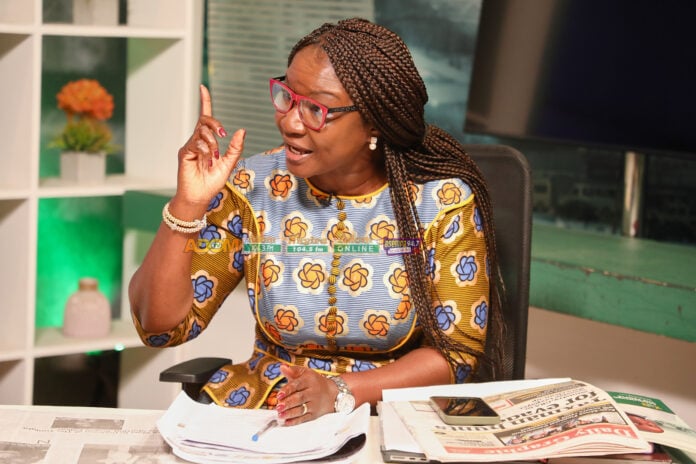As Ghana approaches its pivotal elections on 7th December, the political climate is charged, particularly amid the rivalry between the National Democratic Congress (NDC) and the incumbent New Patriotic Party (NPP). The tension is palpable as key political figures air their grievances. A notable critic is former Deputy Transport Minister Madam Joyce Bawah Mogtari, who has openly condemned the NPP government led by President Nana Akufo-Addo and Vice President Dr. Mahamudu Bawumia. Mogtari has launched a scathing attack on the NPP’s handling of the economy and accused its leaders of corruption while significant socio-economic issues continue to plague the nation. She posits that the ruling party has not taken responsibility for the hardships faced by Ghanaians, which further exacerbates the mounting frustrations as the election looms.
Mogtari articulated her discontent by identifying seven critical areas the NPP has notably ignored during the campaign. She criticized the administration’s silence on serious allegations of corruption and the mismanagement of public funds, asserting that these issues contribute significantly to Ghana’s current economic challenges. This assertion reflects a broader sentiment among the populace regarding the ever-widening wealth gap, rising poverty levels, and soaring unemployment rates. Mogtari’s remarks painted a dire picture of life for many Ghanaians, emphasizing the consequences of political mismanagement and calling attention to the urgency of addressing the nation’s financial woes. Her indictment of the NPP serves as a rallying cry for the NDC, positioning the forthcoming election not just as a political contest but as a fight for the country’s future.
Highlighting the economic mismanagement, Mogtari pointed to incumbent leaders’ unfulfilled promises and the adverse impact of their policies. She emphasized the NDC’s objective in the upcoming elections is not solely about gaining power but to bring about genuine change for the citizens of Ghana. The projected reforms under NDC’s former president, John Mahama, include initiatives aimed at addressing issues of corruption and restoring economic stability. Her argument revolves around Mahama’s proposed governance framework known as O.R.A.L. (Operate, Recover, Audit, and Litigate), which seeks to create accountability and retrieve funds possibly lost to malfeasance in the previous administration. With Mahama at the helm again, the NDC promises a commitment to transparency and responsibility, clearly contrasting with the sentiments surrounding the NPP’s governance.
Mogtari’s critique extends to specific instances of alleged impropriety that have occurred during the NPP’s time in power, employing staggering statistics to highlight this problem. Among these examples is the controversial expenditure of $58 million on the National Cathedral project, which she claims lacks substantial output relative to the funds allocated. She argues that the project administrators are drawing salaries despite minimal visible progress, calling into question the efficacy of such expenditures. Additionally, she points to a $34 million sole-source contract awarded to a company alleged to have connections to President Akufo-Addo’s family, underscoring the NPP’s purported culture of corruption. These examples are particularly damaging to the party’s reputation as allegations of financial misconduct resonate deeply with an electorate yearning for integrity in public office.
The issue of pensioners also features prominently in Mogtari’s critique, as she condemned the government’s controversial financial haircut policy, the first of its kind in Ghana. This policy, which resulted in a 5.37% reduction in pensioners’ benefits, has left many feeling marginalized and betrayed, especially those who have contributed to the nation for years. Mogtari highlighted that while the government implemented austerity measures that affected vulnerable citizens, critical financial questions remain concerning the government’s own fiscal accountability. Her remarks suggest that Ghanaians deserve a government that prioritizes the welfare of citizens over personal or political interests, challenging the NPP’s policies that appear misaligned with the needs of the populace.
Lastly, Mogtari directed criticism at Vice President Bawumia, challenging his silence on urgent economic issues he once actively addressed during previous administrations. She referenced the 170 questions Bawumia posed to former Vice President Amissah Arthur in 2016, which focused on economic performance and transparency. By pointing out the Vice President’s current reticence to publicly respond to these previously articulated economic concerns, Mogtari underscores a perceived hypocrisy in Bawumia’s role as the head of the economic management team. This call to action invites Ghanaians to reflect on Bawumia’s accountability and reassesses his earlier proclamations in light of the current economic challenges. Her probing comments encapsulate the frustrations of many who feel unheard and unrepresented in the political discourse ahead of the elections, thereby further energizing the NDC’s campaign against the ruling party. The political narrative in Ghana is undoubtedly shaping up as one not only about power but about restoring hope, accountability, and a vision for a better future for all citizens.














